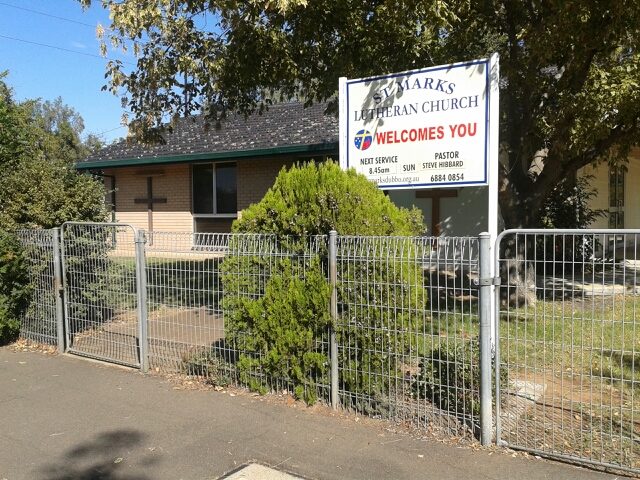John 8:31-32
if you abide in my word you are truly my disciples, you will know the truth and the truth will set you free.

Abide, dwell, live in Christ’s word and the truth will set you free. What wonderful news! Hallelujah! And thank Him too. Freedom! In Jesus you are free. But what does this text have to do with 95 theological statements 500yrs ago? For that matter, why should we care about any history of God’s people? It’s said, ‘we’re New Testament people, we don’t read the Old one; too many weird names.’ Well 500yrs ago there was a Luther, Bugenhagen, Chemnitz, Andrea, and Melancthon; that last one wanted a fancier latin name than the german blackdirt. Some more strange names, but also some more of God’s chosen people. Since the world began there have been followers of the true God, moreso for 5000 odd years and with the penultimate revelation at the centre of all history in the crucifixion and resurrection of our Lord and saviour Jesus Christ. And He said this, abide in me and the truth will set you free.
Now you, like me, might find today Freedom is used in an odd way, ‘America fights for freedom and democracy’, but what about freedom from democracy? When we say we are free, we have to say what we are free to do and what we are free from doing. An example, I am free to criticise the government and free from being killed for that, but in this free country I am not free to build a car without paperwork. So what does Jesus say those who abide in His words are free from? ‘those that sin are slaves to sin.’ We hear this again and again throughout the New Testament, free from sin and a slave to righteousness, the law of the Spirit of life sets free in Christ from the law of sin and death, for freedom you are free so don’t fall again into slavery to sin (Romans 6:18; 8:2; Galatians 5:1; 1 Peter 2:16). Martin Luther was a faithful Christian of the continuing western tradition. He heard God’s command and truly understood the slavemaster of sin that all of us struggle against. He knew despite his hard work and effort in living the perfect life under God’s Law he still fell into pride, laziness, arrogance, and any number of other failings, small by human standards. He had become a slave to his own poor attempts at righteousness, pushed into depression and focusing on his sin, not Jesus Christ his saviour.
But the truth that he then found, the truth that has been taught for 2000yrs throughout the church, the truth that sets us free is this, in Jesus Christ you are forgiven, loved and made new into a new creation, new life free from sin, death and the devil. Simply put that is the gospel, Jesus Christ is Lord, not the devil or anything else; but this doesn’t mean that we are free to do anything we want. This is where we need to be careful still, the reformation is not over, just like Christ’s reign has not finished and your baptism has not stopped effecting you. Jesus says, abide in my words. Live in His teaching, be surrounded by it, breath it, find your protection and life only in the Word of God. Jesus is the source of life and your righteousness, to live in Him is to be free from death and sin. This is the truth! But do you do this? Or do you stray?
For you and me, we are still tempted to walk out from the tent Jesus set up for us (John 1:14), that has existed for 2000yrs (Matthew 16:18), to find our own way in the world, see what others have to say and generally ‘live life’ as they say. It’s easy to see how some things enslave us, or trap us, addiction is an obvious sin, but we all know what sin is, to not ‘love the Lord your God with every part of your being, life body and soul’ the truth Jesus set down in His teaching from God’s ancient people (Deuteronomy 6:4-9). To rely solely on Jesus Christ and what He has done for you. By your own strength this is impossible (1 Corinthians 2:14-16) so Jesus died for you and sent the Holy Spirit to give you faith in Jesus and sustain you on your way (John 14:16-17), this is why Lutherans look only to Jesus, why I try every week to point you to Jesus, because I know you fail to love God perfectly and that His word is true, you are forgiven. When you live and breath the truth you know that it sets you free, you’ve told me that.
But then why are Lutherans not in all the churches? Why are we different? Why so many different denominations, more every year, changing name and pastor again and again; or like the churches of tradition slowly going their way in this weird, chaotic world. Some began out of arrogance, some from unrestrained freedom, some from stubbornness, but all from the attacks of the evil one, and don’t think we are any different. I would not be here if I was not convinced that this is the best example and explanation of Christ’s word, the clearest teaching of His truth, the truth that sets you free. The early Lutheran reformers, properly and uniquely called evangelical and protestant, these brilliant people amongst all the brilliant of God’s people, saw that the truth the sets free had been obscured at that time, in Christ you are forgiven, made anew. They sought to bring this true Christian freedom that was hidden in our western church, to bring this wonder back to its proper centrality, and by its light renew our wonder of all of Christ’s teaching. To clear away the muck and confusion that had built up over the truth and to go back to the faith of our forefathers, to abide as they did in the words of Jesus Christ our Lord. The Roman Catholics now, not what they were 500yrs ago with all that hedonism and corruption, still keep the teachings of Christ though we would say often obscured. And the other side of the reformation have taken the bare minimum and run with that, some even teaching that there was no true Christians for 1400yrs. But they too still have some of Christ’s word, to rely on Jesus is salvation.
This is the reason the Lutheran church should never compromise without, as Luther put it, being convinced by Christ’s Words and plain reason, convinced by the truth; but also why we should never forget our siblings in Christ, the Christians throughout the other denominations, reminding first ourselves, then others of the truth we have been saved by, abiding in Christ’s words passed down through the ages and also of course, bringing that Christian freedom to those who do not yet know it by the Holy Spirit’s help, as we continually live and breath this wonderful news. You are forgiven in Jesus, free from sin, you have life everlasting in Jesus, free from fear of death, and you will be renewed at the end of time in Jesus when all evil is destroyed, ultimately free from the devil’s schemes. Free in Jesus to rejoice, to love, to live; this is the truth we hold to living in Jesus, so in a word, the truth will set you free.
The peace of God which passes all understanding guard your hearts and minds abiding in Christ Jesus, now and forever. Amen.
Joseph Graham.
